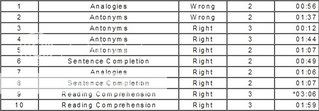- Joined
- Sep 5, 2007
- Messages
- 523
- Reaction score
- 56
Hey guys,
I know this is probably old for many of you but right now I see my career as a clinical psychologist going down the drain, I honestly just feel like crying.
I took the GRE today, having prepared for three months over the summer, studying vocabulary continously (1500 words of which I memorized ~1000 by heart), then studying full time for the last week.
The results were 710Q and 320V
 I have a pretty good feeling about the writing section. No masterpiece but I think my writing was pretty decent considering the fact that coming up with ideas under pressure is not the ideal situation.
I have a pretty good feeling about the writing section. No masterpiece but I think my writing was pretty decent considering the fact that coming up with ideas under pressure is not the ideal situation.
I know that this question has been asked many times but this is especially to those whose first language is not English. Like I said I have memorized almost 1500 words, I have taken about 15 practice test (just 4 days before the test I got a 550 on the verbal which I was very happy about), I have used 2 books: Baron and Princeton which tips were really helpful. In addition to the computer practice tests I have done many excercises on paper.
I'm really running out of ideas. I don't know how to improve my score. I feel like a total failure because I think that this what's going to keep me out of grad school. I had English in school for 9 years and I have been living in the US for over 4 years. I don't need anybody to proofread my papers as they are pretty much without any mistakes (not counting commas, I will never understand these rules ). 3 years ago I got a 573 on the toefl and that was before I started attending college in the US. My skills since then have improved tremendously.
). 3 years ago I got a 573 on the toefl and that was before I started attending college in the US. My skills since then have improved tremendously.
I'm planning to retake it in 4 weeks so I need plenty of advice how to tackle it. I want a 1200 combined, somehow, to at least tell myself that I am semi competitive. Since I dont think my math is gonna be any higher (I was even a little suprised by the 710), I will need a 500 on the verbal.
Please guys, especially those whose first language isn't English, HELP!!! *desparation*
I know this is probably old for many of you but right now I see my career as a clinical psychologist going down the drain, I honestly just feel like crying.
I took the GRE today, having prepared for three months over the summer, studying vocabulary continously (1500 words of which I memorized ~1000 by heart), then studying full time for the last week.
The results were 710Q and 320V

I know that this question has been asked many times but this is especially to those whose first language is not English. Like I said I have memorized almost 1500 words, I have taken about 15 practice test (just 4 days before the test I got a 550 on the verbal which I was very happy about), I have used 2 books: Baron and Princeton which tips were really helpful. In addition to the computer practice tests I have done many excercises on paper.
I'm really running out of ideas. I don't know how to improve my score. I feel like a total failure because I think that this what's going to keep me out of grad school. I had English in school for 9 years and I have been living in the US for over 4 years. I don't need anybody to proofread my papers as they are pretty much without any mistakes (not counting commas, I will never understand these rules
I'm planning to retake it in 4 weeks so I need plenty of advice how to tackle it. I want a 1200 combined, somehow, to at least tell myself that I am semi competitive. Since I dont think my math is gonna be any higher (I was even a little suprised by the 710), I will need a 500 on the verbal.
Please guys, especially those whose first language isn't English, HELP!!! *desparation*




